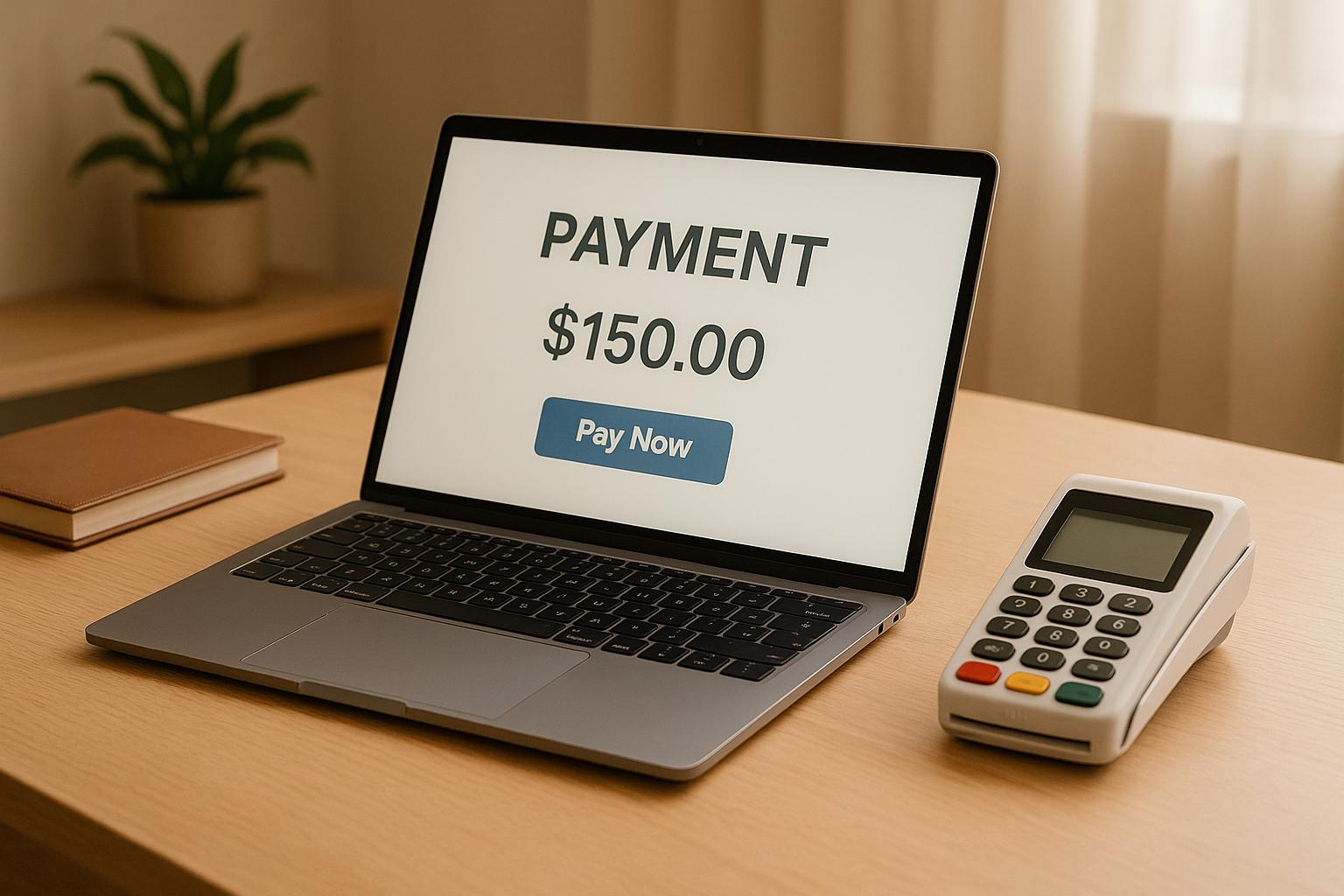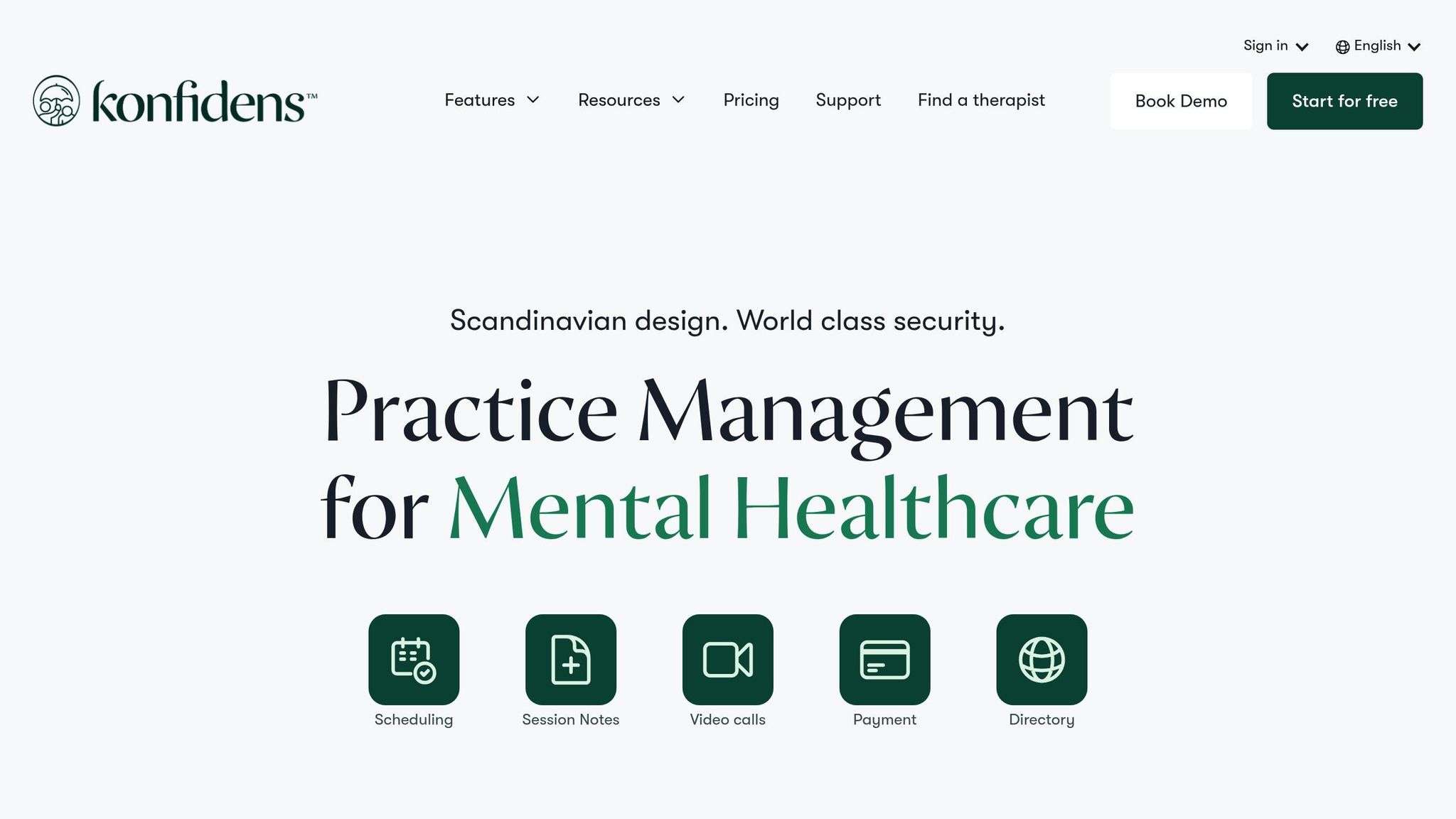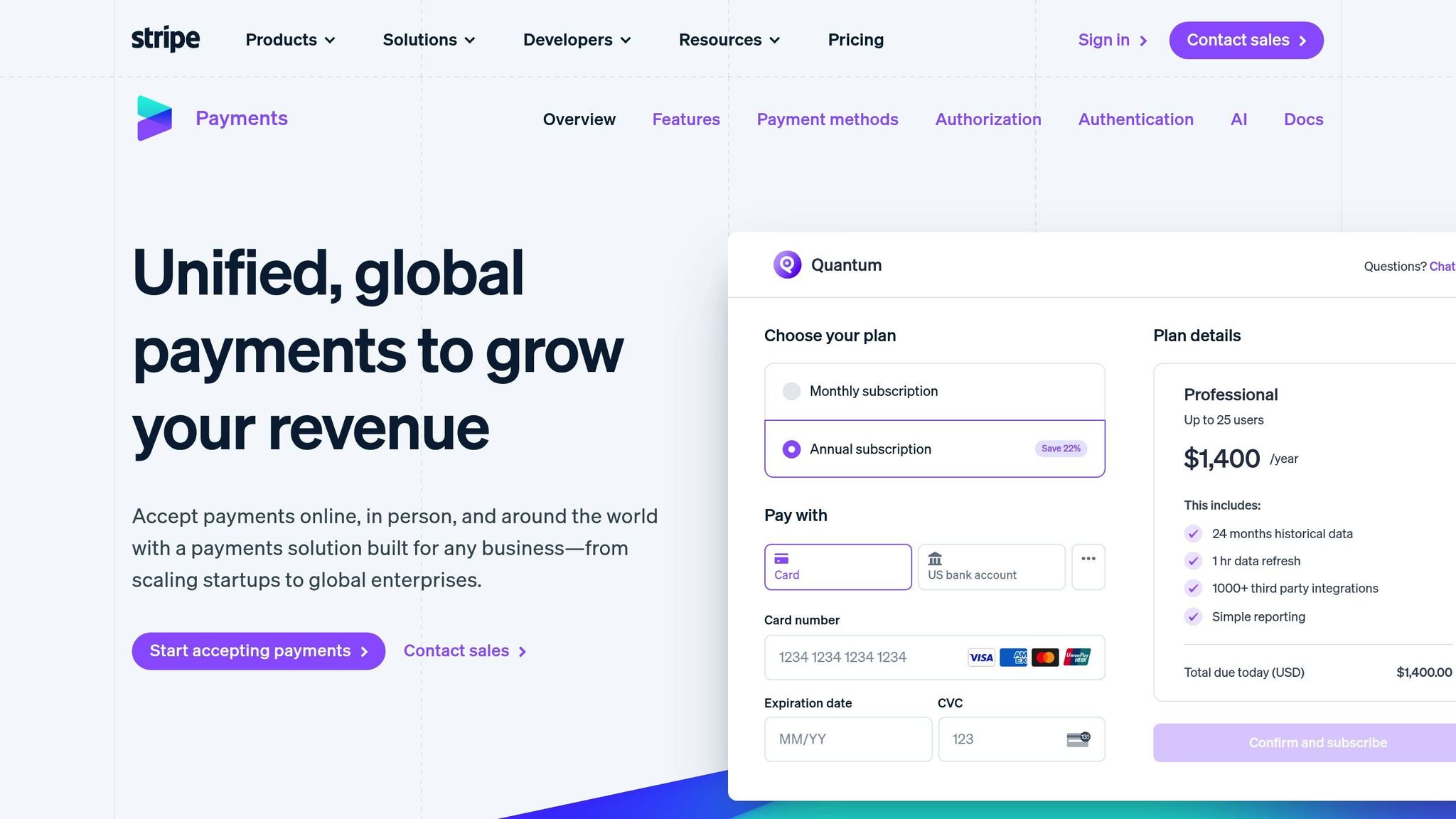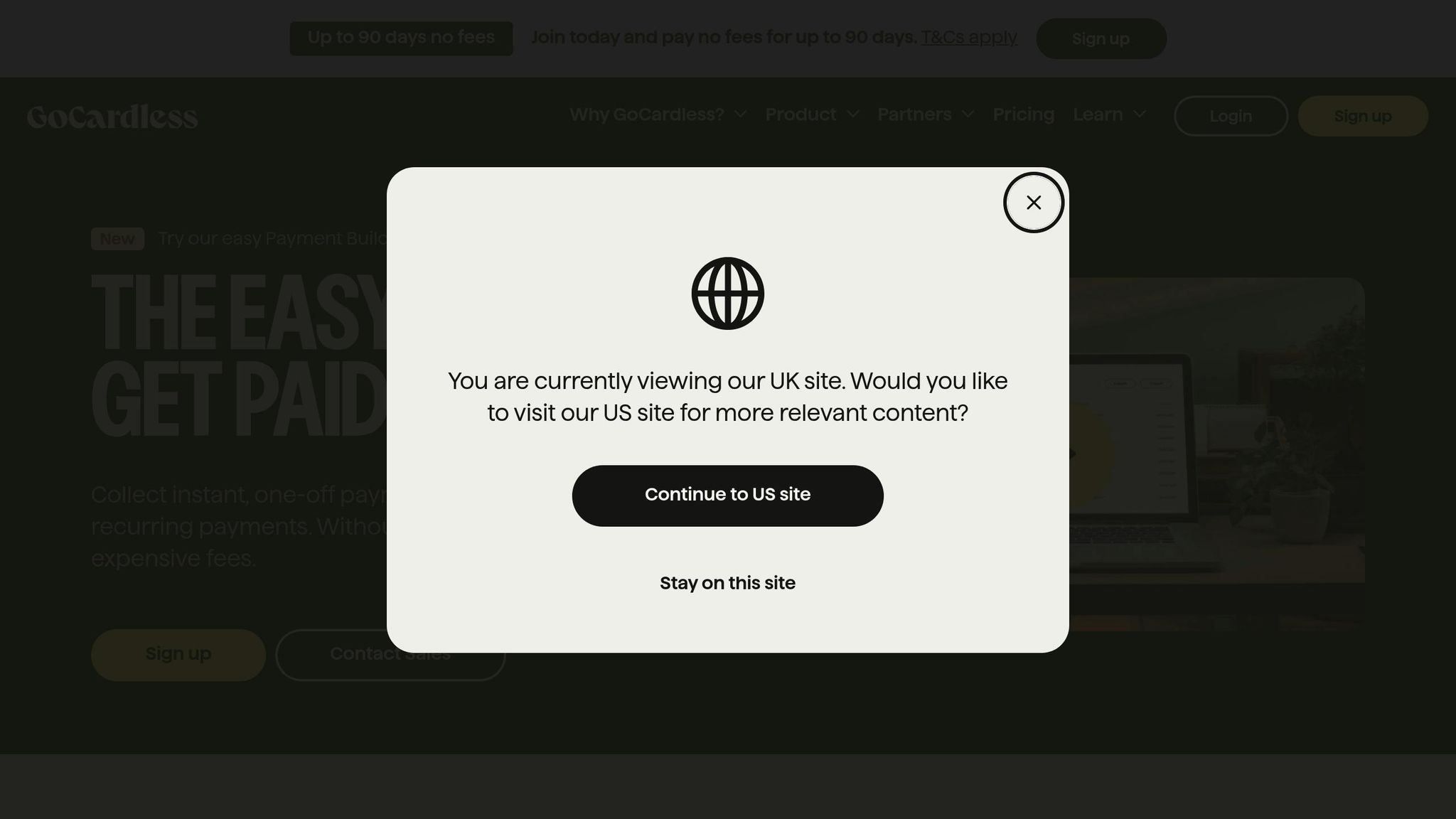5 Best Payment Methods for Private Therapists
Explore the top payment methods for private therapists in the UK, focusing on efficiency, security, and client convenience for managing payments.

Managing payments is a key part of running a private therapy practice in the UK. With therapy sessions often priced at £80 or more, having reliable payment systems ensures smooth operations and builds trust with clients. Here are five payment methods tailored for therapists, each offering distinct benefits:
- Konfidens Payment Collection: Integrates with practice management software, automates invoicing, and complies with GDPR.
- SumUp Card Reader: Portable device for in-person card payments, with simple setup and clear fees.
- Stripe Payment Gateway: Customisable online payment solution with transparent fees for card transactions.
- GoCardless Direct Debit: Ideal for recurring payments, leveraging the UK's Bacs system for steady cash flow.
- Bank Transfers: A straightforward option, often free for domestic payments, but requires manual tracking.
Quick Comparison:
| Payment Method | Transaction Fees | Settlement Speed | Best For |
|---|---|---|---|
| Konfidens | Subscription-based | 1–2 business days | Integrated practice management |
| SumUp | 1.69% per transaction | 1–3 business days | In-person card payments |
| Stripe | 1.5% + 20p (UK cards) | 1–3 business days | Online payments |
| GoCardless | 1% + £0.20 (capped) | 3–5 business days | Recurring payments |
| Bank Transfers | Free (domestic) | Minutes to hours | Simplicity and low costs |
Each option suits different needs, from recurring payments to in-person transactions. Choosing the right system can save time, improve cash flow, and simplify client billing.
1. Konfidens Payment Collection

Konfidens Payment Collection is a tailored payment solution designed specifically for therapists in the UK. It seamlessly integrates into the Konfidens ecosystem, combining clinical and financial management into one platform. This ensures therapists can handle payments efficiently while prioritising data security - two critical aspects for modern private practices.
Konfidens Pay simplifies the entire payment process by automating invoicing, payment tracking, and overdue account follow-ups. It not only processes payments but also generates and sends invoices to clients while keeping real-time tabs on payment statuses[3].
Ease of Integration
For therapists already using Konfidens' practice management software, integrating Konfidens Pay is a breeze. The platform syncs directly with Google, Outlook, and Apple calendars, creating a smooth link between appointment scheduling and payment processing. For example, when a session is booked, an invoice can be automatically generated and sent to the client[4].
The platform also features an intuitive interface and offers robust support through chat, email, and phone. This level of assistance is particularly helpful for therapists transitioning from manual payment systems, making the shift far less daunting[7].
"Konfidens reduces the time we spend on administration by 80 to 90 percent!" – Tom B., Psychotherapist[4]
By automating time-consuming administrative tasks, Konfidens allows therapists to focus on their clients rather than paperwork. This streamlined process ensures quick and hassle-free transaction management.
Speed of Settlement
When it comes to transaction speed, Konfidens Payment Collection delivers. Payments are processed quickly, and its real-time tracking feature lets therapists see which invoices have been paid and which need follow-ups. This clarity helps practices stay on top of their financials without unnecessary delays[3].
GDPR Compliance
Data security is a top priority for Konfidens. The platform complies fully with GDPR, using encrypted EU-based data storage and maintaining detailed audit logs for transparency[5]. Under this system, Konfidens acts as the data processor, while therapists or clinics serve as the data controllers[6]. Additionally, payment information is managed according to Norwegian accounting regulations, which require financial records to be stored for 10 years after the fiscal year ends[6].
Konfidens also ensures that all subprocessors are carefully vetted and that data is used solely for its intended purpose. Detailed privacy policies clearly explain how data is collected, managed, and eventually deleted. This combination of secure practices and clear guidelines provides peace of mind for therapists and their clients alike.
Transaction Fees
Konfidens offers three subscription plans: the free Start plan, Solo at £19 per month (excluding VAT), and Pro at £29 per month per user (excluding VAT). While specific transaction fees for payment processing aren't disclosed, the automation features included in these plans can significantly reduce administrative workloads. By improving follow-ups on overdue payments and streamlining processes, Konfidens effectively offsets any associated costs, making it a practical choice for therapists aiming to manage their practice and finances effortlessly.
2. SumUp Card Reader

The SumUp Card Reader provides a straightforward solution for processing card payments during in-person transactions. By combining portable hardware with an intuitive mobile app, it’s an appealing choice for private practices looking to accept card payments with minimal hassle.
The device connects seamlessly to your smartphone or tablet via Bluetooth or Wi-Fi, making it ideal for therapists who work across multiple locations or conduct home visits. This flexibility ensures that payments can be accepted anywhere, offering a practical option for therapists needing mobility. The SumUp app acts as the central hub for managing transactions and business finances, simplifying the payment process from start to finish.
Ease of Integration
Getting started with SumUp is straightforward. Simply download the app from your device’s app store and follow the on-screen instructions to pair your card reader. The step-by-step guidance ensures you can begin accepting payments without needing any technical knowledge.
Transaction Fees
SumUp operates with a clear fee structure, charging a standard transaction fee of 1.69% per payment[8]. As explained by SumUp:
"We charge a small fee per transaction whenever a payment is paid out to you"[8]
SumUp further elaborates:
"Our card transaction fees are always a flat rate and cover interchange fees and all other additional costs so you'll only ever be charged the rates listed above"[8]
For practices handling higher payment volumes, SumUp offers the SumUp One subscription. For £29 per month, this reduces domestic transaction fees to 0.99% per payment[8][12]. Alternatively, using the SumUp Business Account lowers transaction fees to 1.49%[9]. Importantly, there are no fees for declined transactions or cash payments, keeping costs predictable. Understanding these fees is crucial, especially as settlement timelines can also impact cash flow.
Speed of Settlement
Payments are typically settled within 1–3 business days after the payout is sent[10][11]. Users can customise their payout frequency, choosing from daily (excluding weekends and bank holidays), weekly, or monthly options. For therapists needing quicker access to funds, SumUp One subscribers benefit from next-day payouts by 7:00 AM, including weekends and public holidays, at no extra cost[10][12].
Michael Schrezenmaier, CEO of SumUp Europe, highlighted this commitment to speed:
"We have always made it easier for merchants to get paid - and what can simplify business more than releasing funds even faster than before"[12]
Additionally, the SumUp Business Account offers next-day payment clearing, even on weekends, further supporting efficient cash flow management.
GDPR Compliance
While SumUp ensures secure transactions through encrypted connections, its primary focus is on payment security rather than comprehensive GDPR compliance. Therapists must ensure their overall practice management systems meet GDPR standards to remain compliant.
3. Stripe Payment Gateway

Stripe delivers a secure and streamlined payment solution tailored for UK private therapists. It allows therapists to accept card payments directly through their websites or practice management systems. With its developer-friendly API, Stripe offers extensive customisation options, making it an excellent choice for practices aiming to integrate payment processing seamlessly into their digital platforms.
Transaction Fees
Stripe’s pricing is straightforward and varies depending on card type and origin. For UK cards, the fee is 1.5% + 20p per transaction, while EU cards incur 2.5% + 20p, and international cards are charged 3.5% + 20p. Manual entries come with an additional 0.5% fee, and currency conversions are charged at 1%[13][16]. If a payment dispute arises, Stripe applies a $15.00 fee per case[13].
There are no setup fees, monthly charges, or hidden costs under Stripe’s standard pricing model[14]. Additionally, there are no gateway fees[15], ensuring predictable costs for therapy practices. For businesses handling large payment volumes or requiring tailored solutions, Stripe offers custom pricing arrangements[15].
Since Brexit, cross-border transaction costs have increased. Visa and Mastercard raised interchange fees for UK-EEA consumer transactions to 1.15% for debit cards and 1.50% for credit cards[15], adding to the costs for businesses operating across borders. However, Stripe’s transparent fee structure helps maintain predictable cash flow, ensuring timely settlements.
Speed of Settlement
Stripe processes UK card payments within 1–3 business days[17]. Settlement times vary by payment method, with card payments typically faster than bank debit options, which depend on banking system timelines.
For therapists managing their cash flow, Stripe offers flexible payout scheduling. You can choose daily, weekly, or monthly automatic payouts, or opt for manual payouts for greater control over fund distribution[18]. Importantly, the payout schedule does not impact how long it takes for your pending balance to become available[19].
Different payment methods have specific settlement timelines. For example, Bacs Direct Debit settles in 4 business days, while SEPA Direct Debit takes 6 business days[18]. To avoid cash flow issues, it’s a good idea to maintain a minimum balance in your Stripe account to cover potential refunds, disputes, or fees[18].
Ease of Integration
Stripe stands out for its integration capabilities, making it a flexible option for therapists' digital platforms. Its well-documented API and integration guides simplify the process of embedding payment services into websites or practice management systems. This allows therapists to create a branded and seamless payment experience that complements their existing digital setup.
GDPR Compliance
Stripe adheres to GDPR requirements as both a data controller and processor for UK users. It provides a Data Processing Agreement (DPA) to ensure compliance with GDPR regulations[20][21]. According to Stripe:
"The GDPR requires data controllers to use third parties who agree to abide by certain contractual terms. To be sure of this, the data controller must have Data Processing Agreements ("DPAs") with each third party. Our DPA has been designed to serve this purpose for you; it is strongly aligned with payment transactions, so it should establish that you are compliant with GDPR from a payments perspective."[20]
Stripe also complies with international data transfer standards through certifications and contractual clauses[23].
However, therapists must remember their responsibilities as data controllers. As Stripe highlights:
"As a data controller, Business Users are responsible for the relationship with the data subject (i.e., your End Customer). You may instruct a third party (like Stripe) to process the data, but it is your job to set the purpose (or objectives) and legal basis for the processing."[20]
UK therapists should ensure they have a DPA with Stripe[20][21], provide clients with clear privacy policies, obtain explicit consent for personal data processing, and implement robust technical safeguards to protect client information[22]. With GDPR fines reaching up to €20 million or 4% of annual worldwide turnover[22], maintaining compliance is essential.
4. GoCardless Direct Debit

GoCardless offers a dependable Direct Debit solution tailored for recurring payments, leveraging the UK's Bacs system to automate collections. This platform not only ensures a steady cash flow for therapy practices but also minimises the hassle of manual payment processing. Here's a closer look at its pricing structure, settlement times, and integration features.
Transaction Fees
GoCardless provides three pricing tiers:
- Standard: 1% + £0.20 (capped at £4)
- Advanced: 1.25% + £0.20 (capped at £5)
- Pro: 1.4% + £0.20 (capped at £5.60)
For international transactions, fees are slightly higher:
- Standard: 2% + £0.20
- Advanced: 2.25% + £0.20
- Pro: 2.4% + £0.20
Additionally, transactions over £2,000 incur an extra 0.3% fee. Other charges include £0.50 for refunds and £5 for chargebacks[24]. These predictable costs make it easier for therapists to plan their payment processing expenses.
Speed of Settlement
Payments through Direct Debit follow the Bacs three-day cycle. For existing mandates, funds are collected within 2 working days, while new mandates take 4 working days[27]. Initial payments may take 7-10 working days, but subsequent transactions settle faster, typically within 3-5 working days[28].
For those needing quicker access to funds, GoCardless offers Same Day Settlement, which reduces payout times by 2 business days for eligible users[26]. Additionally, the Instant Bank Pay feature enables real-time settlement, making it an excellent option for immediate first payments, followed by recurring collections[25].
A practical example of this efficiency comes from Gravity Active Entertainment. In June 2023, Shane Williams, their Customer Experience Director, shared:
"Moving to GoCardless Instant Bank Pay has reduced sign-up time by about 40 seconds - or 55% - which gives our staff more time to interact with our members and generate a better customer experience."[25]
Thanks to GoCardless, 90% of their subscription customers now pay via the platform, and they’ve managed to cut transaction fees by 50%[25].
Ease of Integration
GoCardless makes integration straightforward. Its API connects seamlessly with existing practice management systems, while the user-friendly dashboard offers tools for tracking payments and managing customer data. The platform is particularly effective for recurring payments, as it automates fee collections and eliminates the need for manual invoicing.
GDPR Compliance
GoCardless takes data protection seriously. It complies fully with GDPR and is registered with the UK Information Commissioner’s Office under registration number ZA024862[29]. Since September 2016, the company has held ISO 27001 certification, demonstrating its commitment to secure data handling[29].
As a data controller, GoCardless assumes full responsibility for meeting legal obligations related to personal data processing. They state:
"Being a data controller means we have an even greater responsibility to protect your customers' data - and we are directly liable to data protection authorities in relation to all obligations under the GDPR."[30]
For European payments, data is primarily processed on servers located within the European Economic Area (EEA)[29]. The company also provides an online portal for handling data subject rights requests and advises including a link to their privacy notice on payment pages[29]. This strong compliance framework ensures both therapists and their clients can trust the security and reliability of their recurring payment system.
sbb-itb-0b4edca
5. Bank Transfers
Bank transfers are a straightforward and dependable way to collect therapy fees. While they may not have the bells and whistles of newer payment platforms, they remain a solid option, especially for clients who prefer traditional banking.
Transaction Fees
The cost of bank transfers can vary widely depending on your bank and the type of transaction. For domestic transfers within the UK, the Faster Payments Service (FPS) is usually free with most banks, making it a budget-friendly choice for local clients. However, international transfers can come with higher fees.
Here’s how some major UK banks handle international transfer fees: Santander’s Edge Account offers fee-free transfers, First Direct charges up to £5, Halifax typically charges £9.50, and HSBC’s Advance Account fees range from £12 for European transfers to £20 for non-European ones[32]. Same-day high-value transfers using CHAPS can cost between £15 and £55[33]. The Co-operative Bank charges up to £35 for transfers within Europe and 0.25% (with a minimum of £8 and maximum of £35) for transfers outside Europe[32].
It’s also important to consider hidden costs, like exchange rate margins and fees charged by the recipient’s bank. Many banks add a margin to the mid-market exchange rate, which increases the overall cost of international transfers. On top of fees, the speed of fund clearance is crucial for maintaining smooth cash flow.
Speed of Settlement
The speed of bank transfers depends on the method used. Faster Payments typically clear within minutes to two hours, while Bacs and CHAPS take longer but offer predictable timelines. For example, CHAPS ensures same-day settlement if instructions are submitted before the cutoff time[34]. However, due to its high fees, CHAPS is rarely practical for routine therapy payments.
Here’s a quick breakdown of processing times:
| Payment Method | Processing Time |
|---|---|
| Faster Payments | 2 minutes to 2 hours |
| Bacs | 3 business days |
| CHAPS | Same day settlement |
| International Bank Transfer | 1 to 5 business days |
Transfers between accounts within the same bank are often instant[34], while international GBP transfers may take a few days, depending on the destination[34].
Ease of Integration
While bank transfers are simple to set up, they lack automation, which can increase administrative work. Therapists typically provide their bank details on invoices and manually reconcile payments - a process that becomes more time-consuming as client numbers grow.
Unlike integrated payment platforms, bank transfers don’t sync with practice management software or send automatic payment confirmations. This means therapists must manually track payments and chase overdue accounts. Additionally, the absence of automated recurring payment options means clients need to be reminded for each payment, which could disrupt cash flow if deadlines are missed.
GDPR Compliance
Handling client bank details comes with strict data protection responsibilities. Therapists must obtain explicit consent and implement strong safeguards to protect client information. Data should only be retained for as long as necessary, with clear policies in place for securely managing and disposing of banking information[35].
In the event of a data breach - such as unauthorised access to payment records - it must be reported to the ICO within 72 hours if there’s any risk to individuals’ rights and freedoms[35]. Practical steps to ensure compliance include using encryption to secure stored bank details and maintaining robust organisational measures[2].
As Samantha Newport from The Room – Psy puts it:
"Even if the ICO or BACP never knocks on your door, your clients trust you to handle their personal data with the same care you give their wellbeing. That trust is your foundation. Secure it. Maintain it. Honour it."[2]
Therapists should also provide clients with a clear privacy notice explaining what financial data is collected, how it’s stored, and their rights. When banking information is no longer needed, it should be securely destroyed, whether through shredding physical documents or securely erasing digital records[2].
Bank transfers, while simple and cost-effective for clients who prefer traditional methods, work best when paired with modern digital systems to reduce administrative load and improve efficiency.
Payment Methods Comparison
Looking at the detailed overviews above, a side-by-side comparison makes it easier to determine which payment method fits your practice best. Research indicates that 66% of consumers prefer online payment methods [38], and practices using these methods receive payments over twice as fast as those relying on traditional options [38]. Online payments speed up collections significantly - 50% of bills are settled within 7 days, compared to 15 days with traditional methods [38]. For example, one practice reported a dramatic rise in on-time payments, jumping from 60% to 90–95% after adopting Stripe for payment processing [37].
| Payment Method | Transaction Fees | Settlement Speed | Integration Ease | GDPR Compliance | Client Convenience |
|---|---|---|---|---|---|
| Konfidens Payment Collection | Competitive rates | 1–2 business days | Seamless – built into platform | Fully compliant with automated handling | High – integrated booking and payment |
| SumUp Card Reader | 1.69% standard rate | 1–3 business days | Simple hardware setup | Requires manual GDPR management | High – contactless and chip & PIN |
| Stripe Payment Gateway | Variable by card type | Slower than competitors | Moderate – requires technical setup | Requires manual GDPR management | High – supports multiple card types |
| GoCardless Direct Debit | Tiered pricing structure | 3–5 business days | Moderate setup complexity | Requires manual GDPR management | Excellent for recurring payments |
| Bank Transfers | Free to £55 depending on type | 2 minutes to 2 hours (Faster Payments) | No integration – manual process | High compliance burden | Low – requires manual action |
The table above highlights the main features of each payment method, but let’s dive into a few key differences. Transaction fees vary, with noticeable contrasts between Stripe, SumUp, and bank transfers. Settlement speed is another critical factor - Stripe, for instance, processes payments more slowly than some competitors [36].
Convenience for clients is essential for creating a smooth payment experience. GoCardless shines for recurring payments, making it easy for therapists to collect regular fees without any hassle [1]. Card payments, on the other hand, remove the inconvenience of carrying a chequebook or visiting an ATM, which makes accepting credit cards a practical and customer-friendly option [1].
Providing multiple payment options can improve both efficiency and cash flow. Since different clients prefer different payment methods [37], offering a variety ensures faster payments and steadier cash flow [38]. By combining an integrated online platform with a reliable backup option like a card reader, therapists can collect payments effortlessly, whether online or in person.
Conclusion
Selecting the right payment methods can transform how you manage your practice and serve your clients. Digital payment processing not only speeds up payments but also offers flexible billing options, making it easier to deliver a seamless client experience [1]. However, while these systems bring operational benefits, staying compliant with regulations is equally critical.
For therapists in the UK, adhering to GDPR is non-negotiable when handling payment data. With potential fines climbing to €20 million or 4% of global annual turnover, it's vital to implement strong security measures like encryption, access controls, and incident response plans to protect sensitive information [31]. Additionally, the growing prevalence of depressive symptoms [39] has increased the need for accessible and efficient therapy services, making streamlined payment systems even more important.
Digital payment platforms also provide practical tools, such as the ability to charge cancellation or late fees and set up recurring payments via direct debit - features that are particularly useful for teletherapy sessions [1]. These capabilities not only improve cash flow but also reduce administrative burdens.
As discussed earlier, integrated payment systems not only simplify transactions but also ensure client data remains secure. Whether you choose a dedicated platform like Konfidens or combine options such as SumUp and Stripe, the key is to tailor your payment setup to meet your practice's specific needs. This approach can lead to better cash flow, higher client satisfaction, and smoother operations, allowing you to focus on what truly matters - providing quality care to your clients.
FAQs
What should therapists think about when selecting payment methods for their practice?
When selecting payment methods, therapists should focus on security, GDPR compliance, and user-friendliness for both themselves and their clients. It's equally crucial to evaluate costs, such as transaction fees, and ensure the payment system works seamlessly with your current tools or practice management software.
It's also worth considering what your clients prefer. Providing flexible options like card payments, online platforms, or direct debits can make the process more convenient and enhance the overall experience for your clients.
How does GDPR compliance influence the choice of payment systems for private therapists in the UK?
GDPR Compliance in Payment Systems for Private Therapists
For private therapists in the UK, ensuring GDPR compliance is essential when selecting a payment system. The chosen platform must securely manage client data, with key features like strong encryption, privacy safeguards, and secure data storage being non-negotiable.
Using a payment system that meets GDPR standards does more than just help you avoid fines or data breaches - it also demonstrates your commitment to protecting clients' sensitive information. This commitment fosters trust and reassures clients that their data is in safe hands. Always verify that the payment system aligns with UK data protection laws to uphold both legal and professional integrity.
What are the advantages of using digital payment platforms over traditional bank transfers for managing therapy practice finances?
Digital payment platforms bring speed, security, and ease to handling transactions, making them a strong alternative to traditional bank transfers. With instant, contactless payments, they cut down on time spent on manual tasks, letting you focus more on your clients rather than chasing overdue invoices.
Security is another key benefit. These platforms use advanced encryption and fraud protection, ensuring a safer transaction process for both you and your clients. Plus, they offer a more seamless payment experience, which can boost client satisfaction and even encourage quicker payments. By incorporating these systems into your therapy practice, you can simplify financial management while staying compliant with GDPR regulations.




